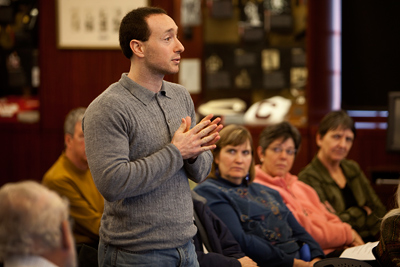Faculty, staff question benefits of proposed budget model
By Susan Kelley


Debate about which colleges would win, and which would lose, dominated a spirited discussion about the proposed budget model Feb. 5. About 40 people attended the brown-bag lunch at Schoellkopf Memorial Hall. Provost Kent Fuchs hosted the event, with task force co-chairs Paul Streeter, associate vice president for planning and budget, and Cathy Dove, associate dean of administration in the College of Engineering.
Several ILR School faculty and staff said the model would transfer too much power and money to the provost and away from the contract colleges.
"You're essentially undoing the decentralization that has made Cornell the great institution that it is," said John Bishop, associate professor of human resource studies in the ILR School. "The provost gets the power to kill off a campus if he wants to and to do whatever he wants."
The proposed model would pool undergraduate tuition, which the Office of the Provost would redistribute to colleges, based on several considerations and such data as university priorities, and students' college of enrollment and college of instruction. The model would also create a fund with which the provost could support institutional priorities, funded by percentage of revenues. The university will adopt a new model by July 1, 2011.
In response to the ILR faction's concerns, committee member Kent Kleinman said the budget model could represent further decentralization, not centralization, depending on one's point of view. "I'm dean of the College of Architecture, Art and Planning and our resources come from the Office of the Provost. From my perspective, this is massive decentralization on a transformative scale. The question I would imagine getting would be precisely the opposite from the questions the ILR faculty and staff have, which is how are we going to survive a decentralized budget model rather than a centralized one. It's the opposite side of the coin."
Danya Glabau '07, one of the few recent alumni to attend, said she supports the proposed model, saying it would make it easier for students to take courses outside their colleges. She majored in biology in the College of Arts and Sciences. "CALS bio majors thought of themselves as second-class Cornell students because they couldn't take a language for four semesters because they would get charged for taking a course outside of CALS," she said. "This is long overdue."
Several in the audience asked about transparency, and the basis upon which the Office of the Provost would redistribute undergraduate tuition. "I'd feel a lot better about this if I knew what you meant by 'transparency' and how that was going to be attained," said Curtis Lyons, director of the Catherwood Library's Kheel Center.
Everyone will be able to track revenues and their sources, and where the revenues are going and why, Fuchs replied. The same would be true for expenses. "Right now, I can't tell you that," Fuchs said. "Right now, virtually all the college deans think that they're all subsidizing the other colleges. Well, they all can't be subsidizing somebody else. [With the new budget model] we will know who is subsidizing whom. We may not be happy about it. But at least it will be clear."
Fuchs is now soliciting feedback on the task force recommendations. In late spring, he will announce the budget model the university will adopt and will then form an implementation committee to hash out the details on how to institute the model for fiscal year 2012.
Media Contact
Get Cornell news delivered right to your inbox.
Subscribe